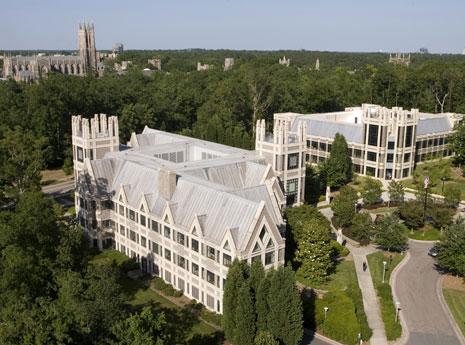
Every patient presents neurosurgeon Gail Rosseau with a view into the world of public policy. The patient with a brain tumor and no insurance opens a window into the problem of access to health care. So does the patient with a worker's compensation injury that has doctors fighting to provide treatment.
Rosseau sees examples of public policies that work -- and those that do not -- in other situations, too. A gifted student might be inspired to pursue a medical career by shadowing a doctor but can't because HIPAA privacy regulations prevent it, or a specialist has to order a redundant diagnostic test on a new patient to avoid liability issues.
"Policy experts have a very valuable role to play, and their counsel must be in partnership with the people in the trenches putting policy into action," says Rosseau, one of two Terry Sanford Distinguished Lecturers speaking during inaugural events for the Sanford School of Public Policy this month. "These two groups should work together, rather than on parallel paths."
That, in a nutshell, was the impetus for Terry Sanford, the former North Carolina governor, senator and Duke president, to found a public policy institute at Duke in 1971 to bridge the gap between the academic and policy worlds. On July 1 this year, the institute was renamed the Sanford School of Public Policy, reflecting its new status as Duke's tenth school.
"As a school, we have much more autonomy; we're more capable of being entrepreneurial," says Bruce Kuniholm, the Sanford School's inaugural dean and former director. "We're constrained only by our own imaginations -- and our capacity to raise the resources necessary."
As part of a yearlong inaugural celebration, events Oct. 1-3 include a dialogue between Rosseau, who was on President Obama's short list for U.S. surgeon general, and John Harwood T '78, the political journalist with The New York Times and CNBC. Richard Fisher, president and CEO of the Federal Reserve Bank of Dallas and a leading thinker in economic circles, and Cokie Roberts, the news analyst for ABC News and NPR, will discuss another topical issue -- the state of the global economy. Policy brief-ings by Sanford faculty and photo exhibits in the school's buildings will also highlight the inaugural celebration.
According to school officials, a public policy major equips students to use their expertise in many sectors -- health, environment, law, business or nonprofits -- to bring about policies for the good of the community, carrying out President Richard Brodhead's call for Duke to "put knowledge in the service of society."
In 1971, the Institute for Policy Sciences and Public Affairs, as it was then known, was bigger than the space it occupied: two small, connecting offices on the ground floor of the Old Chemistry building. Law and public policy professor Joel Fleishman, its inaugural director, remembers heating, sewer and water pipes running along the walls and ceiling of the space that he and his assistant shared in the 11 years Fleishman served as director. As the institute grew, so did its real estate, expanding office by office until it took over the entire first and second floors of Old Chem.
In the early '90s, during the first of Kuniholm's two stints as the institute's director, the university agreed for the institute needed its own building. The Sanford building was dedicated in 1993. Five years later, due in large part to the generosity of alumnus David Rubenstein, the institute built and expanded into Rubenstein Hall.
In 2005, Kuniholm returned to the directorship after an 11-year hiatus and chaired a task force that examined the potential to turn the institute into a school. By attaining school status, Sanford could raise its own funds and provide more financial aid.
"As an institute, we had to stand in line with all of the other department chairs," Kuniholm says. "As a school, we can collaborate and coordinate directly with other deans."
That collaboration includes new faculty hires. Over the past four years, the number of tenure-track faculty has grown from 21 to more than 30. The school has also added joint professorships with the schools of law and environment, and with the global health institute, among others.
"Every one of the substantive issues other schools work on has a policy piece that we can complement," Kuniholm says. "We see ourselves as creating a framework for transforming student lives, giving them the analytical tools they need in broad areas of concentration that we share with other schools."
Fleishman, who will deliver the Founders' Day address, underscored the importance of the school's commitment.
"Because public policy analysis provides a neutral framework for discussion of public problems by those with often strongly opposing views," he says, "it is absolutely essential to the civil discourse required for the successful functioning of democracy, especially in a pluralistic, multicultural society."